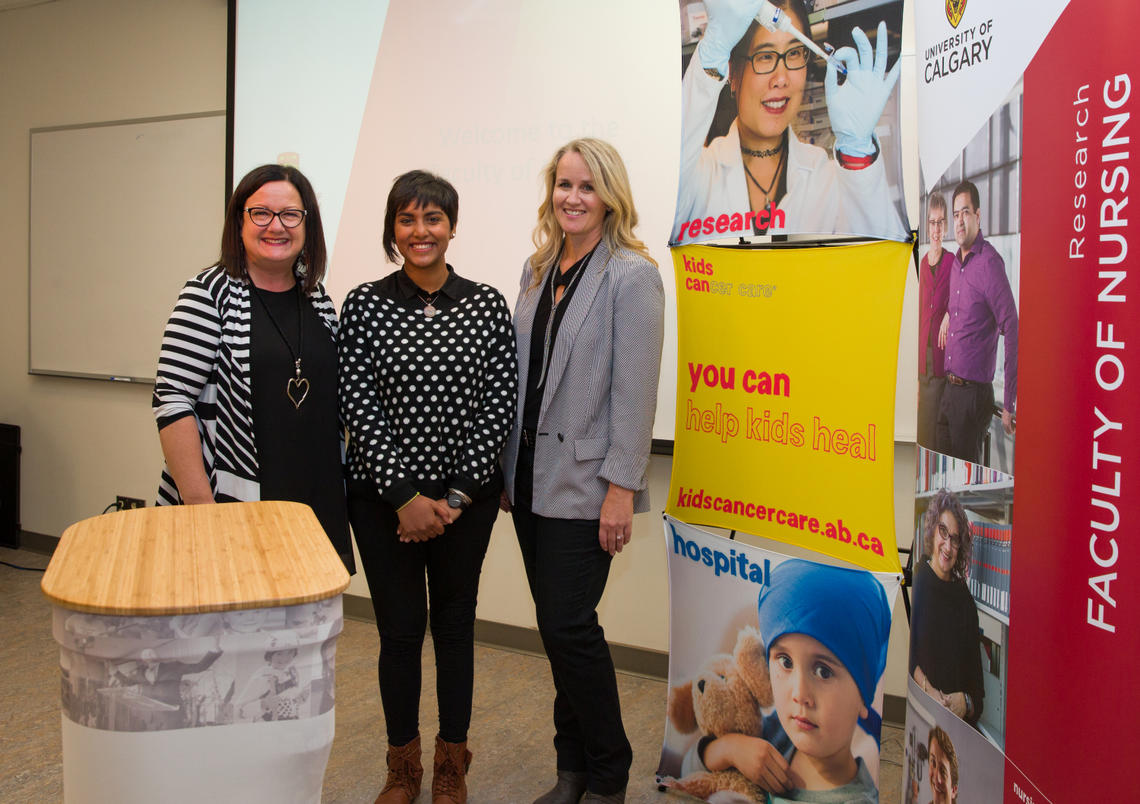
From left: Christine McIver, Anika Haroon, and Catherine Laing
Riley Brandt
Sept. 22, 2016

From left: Christine McIver, Anika Haroon, and Catherine Laing
Riley Brandt
As Faculty of Arts student Anika Haroon recalls, life before she told her digital cancer story was a struggle. “Looking back on my life, before starting my story, to life now, it’s like an awakening,” says the 26-year-old two-time cancer survivor who produced a digital story called Exile and Healing. “I was catatonic. I was struggling just to get out of bed in the morning. Now I’m doing something new every week. Many of these involve doing things I am afraid of.”
Haroon is one of 16 cancer patients or survivors who participated in a research study, led by the Faculty of Nursing’s Catherine Laing, PhD, investigating the effects of digital storytelling on young people affected by childhood cancer and on the health-care professionals. Laing’s research revealed that it wasn’t the cancer itself that survivors were struggling with; it was the emotional fallout of their cancer that was often the issue — be it damaged relationships, shattered body images or impaired physical or cognitive function.
Keeping pain to themselves
“This research shows that we need to find creative ways to address mental health with this population because, while most of them spoke of mental health issues — fear, depression, anxiety, learning difficulties — they all indicated that they were keeping it to themselves and that most would never see a therapist,” says Laing, a former pediatric oncology nurse who is now an assistant professor.
Funded by the Kids Cancer Care Chair in Pediatric Oncology Research Fund, the participants, who were between the ages of five and 32, met with a facilitator to tell their story and select the words and images to represent it. They then composed, recorded and edited their digital stories, which are short first-person video narratives created with a combination of recorded voice, photography, video, music, poetry and other materials.
Storytelling followed by one-on-one interview
After completion, each participant met with Laing for a one-on-one interview, where they explored their experience of producing the digital story, and what kind of impact the process had on them. With approval from participants, Laing then shared a selection of stories with 11 health-care providers, who were later interviewed about watching the stories, reporting that digital stories are powerful, therapeutic, and educational tools with great potential in health care. They offered ideas of using them to help families, in orientation or training programs with staff, and as ways to remind them why they were in their chosen profession.
Laing’s research findings could have major implications for long-term followup of pediatric cancer survivors, calling for a stronger focus on mental health, particularly as it shows up as a late effect of treatment. “Right now, our focus is primarily on the physical issues related to pediatric cancer treatments with much less attention given to mental and emotional health,” Laing says.
Coming to terms with psycho-social effects
“We’re excited to hear the results of Dr. Laing’s research into digital storytelling and we’re proud to support such important work through the Kids Cancer Care Chair in Pediatric Oncology Research Fund,” says Kids Cancer Care founder and CEO Christine McIver. “Although advances in medical research have greatly improved survival rates for many pediatric cancers, the children’s cancer community is only just beginning to understand the long-term fallout of giving cancer treatments to children. We’re starting to see that the psycho-social effects are huge, so we need more research like this to help us understand the less visible side of childhood cancer to help children and families deal with the full extent of this disease.”
By Gail Corbett, Kids Cancer Care